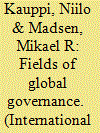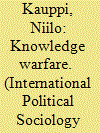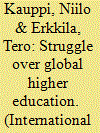|
|
|
Sort Order |
|
|
|
Items / Page
|
|
|
|
|
|
|
| Srl | Item |
| 1 |
ID:
134383


|
|
|
|
|
| Summary/Abstract |
To make global governance intelligible, we need to study a neglected abut crucial phenomenon namely the development of the social division of labor, both in transnational society and more specifically with regard to the fields of politics, law and economics. This nation of a social division of labor has to be distinguished from the mere technical division of labor. The process in question is not merely one of differentiation in an ever more complex world, nor does it take place in a relative power vacuum.
|
|
|
|
|
|
|
|
|
|
|
|
|
|
|
|
| 2 |
ID:
134385


|
|
|
|
|
| Summary/Abstract |
The future of the worlds depends on the knowledge we have of it. Keynes famously added to this that the world is ruled by the ideas of economists and political philosophers- and little else. Bur while nobody would dispute the power of idea, Keynes forgot to add that ideas are always somebody’s ideas. Social group seek to monopolize the ideas they consider valuable and to discredit those that are a threat.
|
|
|
|
|
|
|
|
|
|
|
|
|
|
|
|
| 3 |
ID:
108241


|
|
|
|
|
| Publication |
2011.
|
| Summary/Abstract |
This article examines the intensification, since the creation of the so-called Shanghai list of world universities in June 2003, of a political struggle in which a variety of actors, universities, national governments, and, more recently, supranational institutions have sought to define global higher education. This competition over global higher education has highlighted issues such as the internationalization and denationalization of higher education, the international mobility of students, the role of English language as the language of science, and the privatization of higher education. In contrast to IPE or Marxist analyses, we analyze the symbolic logic of ranking lists in higher education, their uses, and the European Commission's initiative to create an alternative world university classification (see World Social Science Report, UNESCO Publishing; Europa zwischen Fiktion und Realpolitik/L'Europe-Fictions et réalités politiques, Transcript for analysis). This initiative represents a political move in a process of rapid restructuration of higher education at the global level.
|
|
|
|
|
|
|
|
|
|
|
|
|
|
|
|
|
|
|
|
|